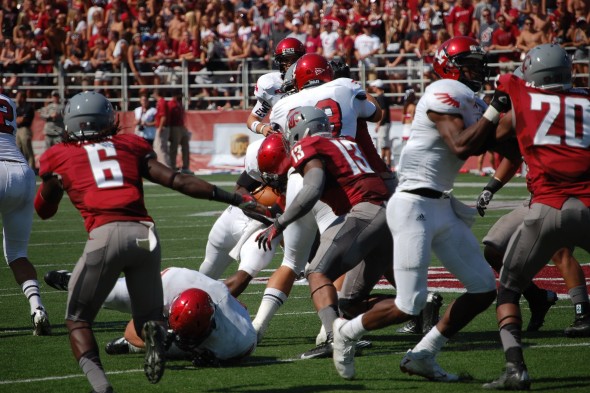
PULLMAN — Connor Halliday surprised the small collective tuned in to Monday’s press conference when a reporter asked him about Washington State’s annual trip over the Cascade Mountains to play a conference game at CenturyLink Field.
“It’s not a true home game. It’s frustrating we don’t get to play the game in Martin Stadium,” said the Cougars quarterback. “I wish all of our home games were here. I don’t see why we have to go someplace else to play a home game. That’s my opinion.”
Such bluntness is rare from the face of a program reeling from Saturday’s 35-34 loss to the Ricky Martin-bad Colorado Buffaloes.
Unclear to Halliday are the financial virtues of hosting a home game at the Clink (capacity 67,000) as opposed to Martin Stadium (capacity 34,000). WSU has sold about 56,000 tickets to Saturday’s 7:30 p.m. game against the No. 2-ranked Oregon Ducks. The WSU athletic department will collect twice the revenue that a typical September home game in Pullman generates (about $2 million.)
But at what cost?
With a rabid, painfully obnoxious collection of Phil Knight enthusiasts, Oregon supporters could outnumber WSU fans. On Aug. 1, WSU had sold just 35,137 tickets through its website. Three days later they went on sale to the general public.
Those numbers don’t factor the number of Cougs who slammed their season tickets in the trash after watching WSU blow a 17-point lead in seven minutes to the worst team in the FBS.
Even Oregon athletic director Rob Mullens sounded delighted with the thought of his fans making the short trip up the I-5 corridor.
“We are looking forward to this game Saturday against Washington State,” he said in open letter to fans earlier this week. “We have an opportunity to make CenturyLink Field virtually a home game, and show yet another national television audience the strength of our passionate fan base.”
Halliday’s comments came as Moos began his annual week-long campaign to rally a west side alumni base that has yet to buy into the Mike Leach regime. At $30 million, WSU currently has the lowest operating budget in the Pac-12.
Except for 2010, the Cougars have hosted a game in Seattle since 2002. WSU is an unimpressive 5-4 in those contests. The current two-year agreement to play both Oregon schools that started in 2011 will reportedly be renewed. Last year, the Beavers embarrassed Paul Wulff’s 4-8 Cougars team 44-21 in front of a mostly empty stadium.
Barring Kenjon Barner experiencing episodic flashbacks from this, WSU has little chance to upset a Ducks team that pummeled Arizona 49-0 in Eugene last week.
When the Cougars stumble off the field late Saturday night after surrendering 60 points, will the $2 million generated from ticket sales really be worth it?
Not at all.
WSU will reel in some $15 million from the Pac-12 Networks’ lucrative new television deal this season. That money should offset the need to snatch a few million bucks for a university that possesses perhaps a unique home field advantage.
Pullman isn’t an easy place to get to. There’s a reason UCLA hasn’t won at Martin Stadium since the Reagan administration.
Spoiler alert: It’s not for a lack of talent.
Years back, I saw a University of Washington fan wearing a t-shirt that read: “All Dirt Roads Lead to Pullman.”
Well, a few of them actually do.
Displacing a home game made sense for former athletic director Jim Sterk when WSU couldn’t compete financially with Pac-12 heavyweights. Now, it comes off as a desperate attempt to appeal to the big-time donors in the 206.
WSU defensive end Xavier Cooper, a Tacoma native who said he will have more than 20 friends and family members in attendance, best summed up the prevailing sentiment best.
“I wish the game was (in Pullman),” he said. “We deserve to have it here, but obviously that isn’t my decision.”

6 Comments
One factor not considered is the loss of revenue to the Pullman community when a WSU home football game is not played in Pullman. Think of the restaurants, hotels, gas stations, grocery stores, etc. that are not able to take advantage of the “home” game in Seattle.
One factor not considered is the loss of revenue to the Pullman community when a WSU home football game is not played in Pullman. Think of the restaurants, hotels, gas stations, grocery stores, etc. that are not able to take advantage of the “home” game in Seattle.
One point that isn’t made here is that there are a ton of WSU grads living on the coast that will be salavating for the chance to see their Alma mater. Unfortunately, The coastal fans, though mostly UW would, if UW couldn’t win, root for the Cougars. That feeling is not reciprocated.
With nearly 80,000 alums on the west side of the state, you’re exactly right Bayview Herb. In fact, it’s likely the biggest reason Moos opts to play one game a year at Century Link. However, convenience for fans shouldn’t outweigh the competitive disadvantage it puts the program in.
One point that isn’t made here is that there are a ton of WSU grads living on the coast that will be salavating for the chance to see their Alma mater. Unfortunately, The coastal fans, though mostly UW would, if UW couldn’t win, root for the Cougars. That feeling is not reciprocated.
With nearly 80,000 alums on the west side of the state, you’re exactly right Bayview Herb. In fact, it’s likely the biggest reason Moos opts to play one game a year at Century Link. However, convenience for fans shouldn’t outweigh the competitive disadvantage it puts the program in.